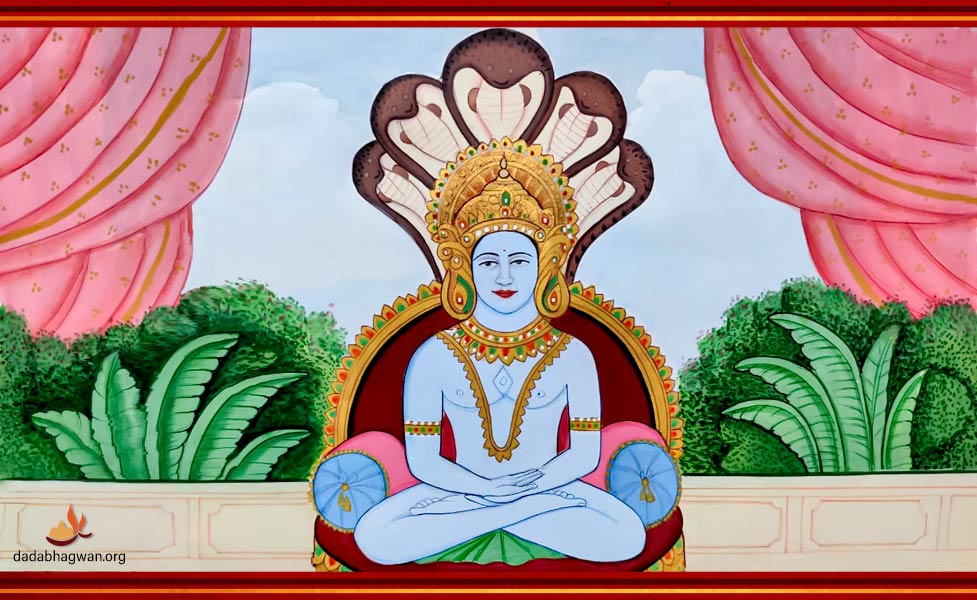Shree Parshwanath Bhagwan: Life Stories of the Twenty-third Tirthankara
Shree Parshwanath Bhagwan, who is also known as Parasnath Bhagwan, was the 23rd Tirthankar of our present time cycle. He lived for a 100 years.

Shree Parshwanath Bhagwan’s laanchhan is snake. Parshwa Yaksh Dev and Padmavati Yakshini Devi are His Shaasan Dev and Shaasan Devi, respectively.
The Vengeance Between Shree Parshwanath Bhagwan and Kamath
Kamath’s vengeance with his brother Marubhuti over sexual interactions with woman continued for nine lifetimes. Even in the tenth lifetime, when Parshwanath became the Tirthankara, this vengeance did not leave Him. In the final lifetime, when the Lord attained complete Vitaraag (absolutely detached) state, the vengeance was dissolved. Kamath had intense anger towards his younger brother Marubhuti. From this krodh Kashaya (inner enemies of anger, pride, deceit and greed) arose intense abhorrence, contempt, dismissing with contempt, and ultimately deep vengeance. This vengeance was so strong that Kamath killed Marubhuti in every one of the nine lifetimes. When the krodh Kashay takes a fierce form, it leads to terrifying vengeance; and when such vengeance arises from sensual desires, it becomes even more dangerous. The deepest vengeance stems from illicit sensual desires. In the current fifth era, that is, in Kaliyug, enmity has spread across the whole world. The story of Marubhuti and Kamath shows us how much harm such vengeance can cause.
Shree Parshwanath Bhagwan’s State of Absolute Detachment
The serpent and serpentess trapped in the log were extremely fortunate to attain death while listening to the sacred Navkar Mantra directly from the holy mouth of the Tirthankar Lord. Such a moment of departing the body is granted only to a truly fortunate one! At the time of death, due to their elevated spiritual state, the male snake and female snake were reborn as Dharanendra Dev and Padmavati Devi, respectively. Lord Parshwanath became the supreme cause for their birth in the heavenly realm. As a result, Dharanendra Dev and Padmavati Devi held deep reverence and attachment for Lord Parshwanath. Based on this devotion, they protected the Lord during Meghmali’s upsarga (externally induced afflictions/sufferings), they sheltered the Lord with a canopy of serpent hoods and lifted Him by taking the form of a lotus. On the other hand, even though Kamath was reborn as Meghmali Dev and inflicted fierce upsargas, Lord Parshwanath held not even the slightest abhorrence towards Meghmali Dev, nor the slightest attachment towards His protectors. While all Tirthankaras were absolutely detached, in this incident of Lord Parshwanath, one can truly witness and marvel at His absolutely complete state of detachment, a state so pure, it evokes deep reverence.
Lord Parshwanath had nine previous births. Let us read in detail about His past lives and His life story from birth to Nirvana in two parts.
Lessons from the Life of Shree Parshwanath Bhagwan
The obstacles and hardships caused by Kamath in the life of Lord Parshwanatha were endured by Him with perfect equanimity; not even a single atom of His inner peace was disturbed. Remaining beyond attachment and abhorrence, He calmly bore all the consequences of His karma and ultimately attained liberation.
So many life events unfold as the result of past karmas, and ultimately, we must let go of all of them! The greatest lesson is that only if we remain in a state of complete detachment while letting go, can we truly be free from those karmas. Parshwanath Bhagwan, the supremely detached Paramatma, held not even the slightest hatred toward those who caused Him immense suffering, nor the slightest attachment toward those who rendered Him the highest help. His divine life story truly serves as an inspiring example for us all. In our everyday lives, many such moments arise throughout the day where attachment and abhorrence surface every now and then. In those times, if we remember the life events of the Tirthankars and reflect on how They remained free from attachment and abhorrence, it can give us a lot of inner strength. It brings a pause within us. This will surely help bring us down from intense Kashays to milder ones. Even though attaining complete Vitaraagata may not be immediately possible, reducing the intensity of Kashay is certainly achievable. And the softening of Kashay gradually leads us towards samkit (right Vision).
Today, people do worship of Parshwanath Prabhu with great faith and devotion. In the entire world, maximum temples are that of Lord Parshwanath, as Padmavati Devi is tremendously brightening the Lord’s shaasan (reign). The function of Shaasan Devas and Shaasan Devis is to ensure that people are devoted to and worship the Tirthankara Bhagwan and they move towards the path of salvation. However, in today’s times, as the terrible empire of ignorance prevails worldwide, people do not worship the Shaasan Devas and Shaasan Devis for attaining Moksha; rather, they keep fasts and resolve to get rid of their worldly material obstacles.
We must always remember that the Shaasan Devas and Shaasan Devis are celestial beings of the highest order. They never get into fulfilling people’s worldly desires. Each one gets the fruits of their own bad and good deeds. They do whatever they can for people’s Moksha. Therefore, we must earnestly worship Padmavati Devi and seek Her blessings only for the purpose of salvation (the ultimate liberation).
subscribe your email for our latest news and events





